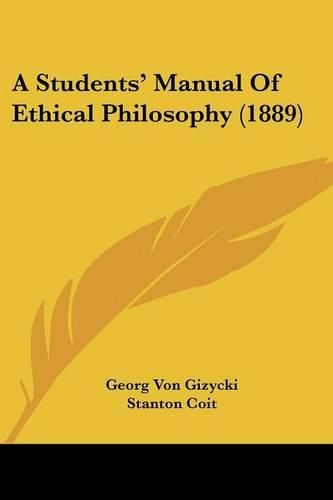Readings Newsletter
Become a Readings Member to make your shopping experience even easier.
Sign in or sign up for free!
You’re not far away from qualifying for FREE standard shipping within Australia
You’ve qualified for FREE standard shipping within Australia
The cart is loading…






Purchase of this book includes free trial access to www.million-books.com where you can read more than a million books for free. This is an OCR edition with typos. Excerpt from book: CHAPTER II. THE STANDARD OF MORALS.?(Continued.)
My country is the world, My countrymen are mankind. ?W. L. Garrison. (r.) The Method of Determining Right Action. The highest criterion of moral action is not the greatest happiness of the smaller number, which indeed has often been the ruling principle of political law-givers, nor is it the greatest happiness of the greatest number in the sense of the majority without regard for the happiness of the minority, but it is the universal welfare, the enduring happiness of all. Actions are right or not, according as they advance or retard the general welfare. But is it then so easy to calculate the consequence of conduct upon human weal and woe ? How difficult it is for us to determine the influence of a given act even on our own life’s happiness, how often it is entirely impossible; and now it is demanded of us to determine the consequences of our conduct upon the well-being of all! Bentham requires that, in order to determine the worth of an action, we should make out what the intensity of the pleasure and pain is which it produces; what the duration of these is; how great the certainty and uncertainty that such feelings will actually be brought forth by the action; what the fruit- fulness of these feelings is, that is, what the chances are that they will awaken future feelings of the same kind?pleasures when the feeling is one of pleasure, pain when it is a feeling of pain; what the purity of these feelings is, that is, what the chances are that feelings of an opposite nature will not set in as a consequenceof them: pain if they were pleasant, pleasure if they were painful; lastly, what the extent of the feelings is, that is, what the number of persons is whose feelings of pleasure or pain the act influences. In re…
$9.00 standard shipping within Australia
FREE standard shipping within Australia for orders over $100.00
Express & International shipping calculated at checkout
Purchase of this book includes free trial access to www.million-books.com where you can read more than a million books for free. This is an OCR edition with typos. Excerpt from book: CHAPTER II. THE STANDARD OF MORALS.?(Continued.)
My country is the world, My countrymen are mankind. ?W. L. Garrison. (r.) The Method of Determining Right Action. The highest criterion of moral action is not the greatest happiness of the smaller number, which indeed has often been the ruling principle of political law-givers, nor is it the greatest happiness of the greatest number in the sense of the majority without regard for the happiness of the minority, but it is the universal welfare, the enduring happiness of all. Actions are right or not, according as they advance or retard the general welfare. But is it then so easy to calculate the consequence of conduct upon human weal and woe ? How difficult it is for us to determine the influence of a given act even on our own life’s happiness, how often it is entirely impossible; and now it is demanded of us to determine the consequences of our conduct upon the well-being of all! Bentham requires that, in order to determine the worth of an action, we should make out what the intensity of the pleasure and pain is which it produces; what the duration of these is; how great the certainty and uncertainty that such feelings will actually be brought forth by the action; what the fruit- fulness of these feelings is, that is, what the chances are that they will awaken future feelings of the same kind?pleasures when the feeling is one of pleasure, pain when it is a feeling of pain; what the purity of these feelings is, that is, what the chances are that feelings of an opposite nature will not set in as a consequenceof them: pain if they were pleasant, pleasure if they were painful; lastly, what the extent of the feelings is, that is, what the number of persons is whose feelings of pleasure or pain the act influences. In re…